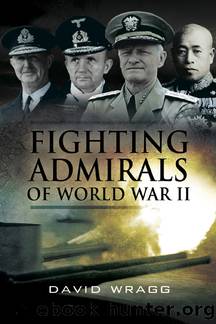Fighting Admirals of World War II by David Wragg

Author:David Wragg
Language: eng
Format: epub
Tags: Bisac Code 1: BIO008000
ISBN: eBook ISBN: 9781844685424
Publisher: Pen and Sword
Published: 2009-02-18T16:00:00+00:00
Chapter 13
âCatnapping at meetingsâ
Admiral of the Fleet Sir Alfred Dudley Pound, RN (1877â1943)
One of the most experienced British naval officers in 1939, Pound had commanded a battleship at the Battle of Jutland in 1916. Knighted in 1933, he held the prized position of Commander-in-Chief Mediterranean in 1936, and when the post of First Sea Lord had to be filled in June 1939, the first choice fell ill and the position was offered to Pound, who was promoted to the five-star rank of admiral of the fleet in July.
Born on the Isle of Wight on 29 August 1877, Pound did not come from a naval family, although his home was not far from the major Royal Navy base at Portsmouth. In 1891, at the age of fourteen, Pound entered the Navy as a cadet at Dartmouth. He advanced rapidly and by 1916 was a captain commanding the battleship HMS Colossus. He led her at the Battle of Jutland with notable success, sinking two German cruisers, beating off two destroyers and eluding five torpedoes.
After the war, Pound was posted to naval planning and became head of the planning division in 1922. During Roger Keyesâ tenure as Commander-in-Chief of the Mediterranean Fleet in the late 1920s, Pound was his Chief of Staff. In 1936, he became Commander-in-Chief of the Mediterranean Fleet, serving until 1939, which meant that he was in the Mediterranean when Italy invaded Abyssinia and the League of Nations refused to take action, largely because of French objections. His elevation to First Sea Lord came at a time when he was already showing the first signs of failing health.
Unusually shy for a very senior naval officer, Pound avoided publicity, even after he was appointed First Sea Lord on 31 July 1939. His health was already poor, but other experienced British admirals were also in bad shape. An incipient brain tumour was diagnosed by a naval medical officer, who did not tell the Admiralty. In addition, Pound also suffered problems with his hips, which kept him awake at night and so caused him to doze off at meetings.
There are sharply divided opinions of Pound from this time. Although his staff at the Admiralty found him easy to work with, admirals and captains at sea accused him of interference with their operations, which resulted in a number of serious clashes with Admiral John Tovey, the Commander-in-Chief of the Home Fleet. Winston Churchill, with whom he worked from September 1939, found him fairly easy to dominate, but he was able to frustrate Churchillâs dramatic idea of sending a battle fleet into the Baltic early in the War. In this, he undoubtely saved the Royal Navy from the embarrassment of having ships bottled up in the Baltic where the Luftwaffe and German U-boats could have picked them off one at a time.
Perhaps Poundâs greatest achievement was his successful campaign against German U-boat activity and the winning of the Battle of the Atlantic (1939â1945). On the other hand, his most criticized decision was ordering Arctic Convoy PQ17 to scatter, against the advice of his senior commanders, with disastrous results.
Download
This site does not store any files on its server. We only index and link to content provided by other sites. Please contact the content providers to delete copyright contents if any and email us, we'll remove relevant links or contents immediately.
The Light of Days by Judy Batalion(836)
Stalin's War: A New History of World War II by Sean McMeekin(693)
The Pacific War 1941-1943 by James Holland(623)
Walk in My Combat Boots by James Patterson(620)
Victory's Price (Star Wars) by Alexander Freed(591)
The Vietnam War: An Intimate History by Geoffrey C. Ward & Ken Burns(576)
First Platoon: A Story of Modern War in the Age of Identity Dominance by Annie Jacobsen(572)
The American War in Afghanistan by Carter Malkasian(565)
Cold War (Alexander King Book 2) by Bradley Wright(561)
Operation Pedestal by Max Hastings(555)
Blood and Ruins: The Great Imperial War, 1931-1945 by Richard Overy(543)
Concepts of Space by Jammer Max;(526)
The Madman Theory by Jim Sciutto(526)
Extreme Fitness by Chris McNab(520)
Flying Tiger by Samson Jack(508)
World War II Infantry Fire Support Tactics by Gordon L. Rottman(508)
Pathfinders by AL-KHALILI JIM(499)
Panzerkrieg by Mike Syron(492)
Hitler’s Pre-Emptive War: The Battle for Norway, 1940 by Henrik O. Lunde(488)
